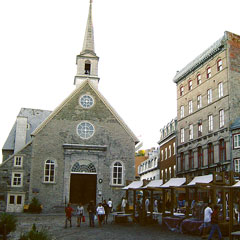Quebec bishops seek help to maintain historic churches
By Deborah Gyapong, Canadian Catholic News OTTAWA - Quebec’s Catholic bishops have asked the province to consider better ways to help maintain the churches and religious buildings associated with the provinces’ cultural heritage.
OTTAWA - Quebec’s Catholic bishops have asked the province to consider better ways to help maintain the churches and religious buildings associated with the provinces’ cultural heritage.The request by the Assembly of Catholic Bishops of Quebec’s religious patrimony committee was made in a Nov. 11 submission to the province’s Parliamentary commission of culture and education, but not made public until early February.
In it, the bishops suggested revisions to Quebec’s Cultural Property Act.
The bishops pointed out large sums of money are needed to maintain and restore churches and historic buildings belonging to religious communities. Otherwise, church properties will continue to be sold to developers who may turn them into condominiums or concert halls, they said.
“The Church is rich in patrimony, but not in monetary capital,” they wrote. “She does not benefit from fixed revenues, nor does she have the power to tax.”
The costs of maintaining heritage buildings is often more than they can afford, they said.
The religious buildings of Quebec are not only the exclusive property of those who worship in them, but are “family heirlooms” that benefit all of society, the bishops wrote.
The bishops suggested some revisions to the present law that would divert funds to church buildings even if they do not have an official heritage designation. They also noted that municipalities cannot usually afford to carry out their role in heritage preservation, especially in rural areas of Quebec. They also noted the law needed to have more incentives for heritage preservation than threats of punishment and of an impression of “patrimony police.” There also needed to be more clarity in how a heritage designation is determined.
McGill University historian John Zucchi said Quebeckers would not have problems with the bishops’ request “as long as it’s not too expensive.”
“The bishops are probably right to bring this out on the table, to make it clear to this commission that you can’t start talking about preserving cultural heritage without putting money on the table,” he said.
Zucchi noted there is a side of Quebec that is increasingly “upset with multiculturalism” and “looking back and referring to its cultural heritage, including its Catholic cultural heritage.”
There are broader questions, however, of the future of the Catholic faith in Quebec and not whether the churches are “museums that essentially speak to our past,” he said.
“We’re working with a mindset that we are now in a post-Christian age in Quebec,” he said, noting the default position is that “no one is using these buildings” and there are no funds to maintain them.
Zucchi also raised concerns about what conditions the state might attach to any funding.
“If the state is going to fund these cultural sites, it is not unconditional funding,” he said. “It’s going to be a mine field and the Church has to be very mindful of this.”
Though the bishops are right to make the state aware of the problems, Zucchi urged caution to see “what strings are attached.”
“There is this idea in Quebec, especially from the state side, that the churches were made with the funds of the people and therefore in a sense, these churches are part of the cultural heritage of Quebec and belong to Quebec society or even worse the state,” he said.
“These churches were built by the Catholic faithful in the past.”
Please support The Catholic Register
Unlike many media companies, The Catholic Register has never charged readers for access to the news and information on our website. We want to keep our award-winning journalism as widely available as possible. But we need your help.
For more than 125 years, The Register has been a trusted source of faith-based journalism. By making even a small donation you help ensure our future as an important voice in the Catholic Church. If you support the mission of Catholic journalism, please donate today. Thank you.
DONATE
